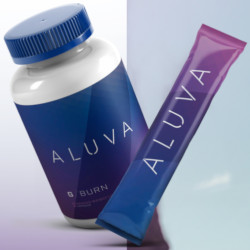Aluva operates in the nutritional supplement MLM niche.
The company originally launched late last year as Nektar Life Global. It was renamed Aluva on or around February 2021.
That said, Aluva’s “website terms & conditions” state:
This Site belongs to Nektar Life, LLC, a Utah limited liability company d.b.a. ALUVA.

As per Dickson’s Aluva corporate bio;
I have spent countless hours in the research and development of different nutritional supplements and millions of dollars investing in health protocols from around the world.
Finally, with the help of all my experience and the expertise of specialized scientists and chemists, I have formulated a line of products that I can truly say is the best of what I’ve found and one that I’m proud to put my name on.
I wasn’t able to pin down Dickson’s MLM history. Certainly on the executive side Aluva seems to be his first venture.
Outside of MLM Dickson runs BitWealth, a Utah venture capital group.
Ventures BitWealth has invested in include Opiniion and Kiln. Dickson was also co-owner of Fremont Island in the Great Salt Lake for a few years.
Last year Dickson was part of PayItForwardUtah, a food drive initiative launched in response to the COVID-19 pandemic.
In late 2020 Dickson shared plans to acquire and flip restaurants. Whether that was in addition to launching Aluva or a transition is unclear.
Update 31st October 2021 – In the above sentence I had linked to a YouTube video in which Dickson detailed his restaurant flip plans.
As at the time of this update that video has been marked as private. As such I’ve disabled the previously accessible link. /end update
On its website Aluva provides a Kiln corporate address in Utah.
Read on for a full review of Aluva’s MLM opportunity.
Aluva’s Products

- Ignite – “made to give you the same amount of energy as the competition just a healthy version without a crash”, retails at $100 for a box of twenty-five single-serve sachets
- Life Greens Tub – “packed with super nutrients, probiotics, prebiotics and vital minerals that supports digestive health, better nutrient absorption for prolonged energy, immune health, wellness and vitality”, retails at $100 for a bottle of thirty single-serve sachets
- G/Burn – “weight loss blend developed over years of research and product formulation”, retails at $100 for a bottle of thirty capsules
According to their nutritional labels, Aluva’s products are manufactured in the US.
Aluva’s Compensation Plan
Aluva’s compensation plan is rank-based. Commissions are paid out via a ten-level deep unilevel team.
Aluva Affiliate Ranks
There are five affiliate ranks within Aluva’s compensation plan.
Along with their respective qualification criteria, they are as follows:
- A1 – generate and maintain 50 PV a month and recruit and maintain one affiliate
- A2 – generate and maintain 90 PV a month and recruit and maintain two affiliates
- A3 – generate and maintain 155 PV and 15,000 GV a month (max 7500 GV from one unilevel leg and 2500 GV from two other legs), and recruit and maintain three affiliates
- A4 – generate and maintain 235 PV and 50,000 GV a month (max 25,000 GV from one unilevel leg and 10,000 GV each from two other legs), and recruit and maintain four affiliates
- A5 – maintain 235 PV a month, generate and maintain 100,000 GV a month (max 25,000 GV from four unilevel legs each), and maintain four personally recruited affiliates
PV stands for “Personal Volume” and is sales volume generated by retail sales and an affiliate’s own purchases.
GV stands for “Group Volume” and is PV generated by an Aluva affiliate and their downline.
Note that in order to count towards rank qualification, recruited affiliates must generate and maintain at least 80 PV a month.
Retail Commissions
Although not specifically referenced in Aluva’s compensation plan, I believe retail commissions come under level referral commissions.
This would mean Aluva pays a 20% commission on sales volume generated by retail customer orders.
Residual Commissions
Aluva pays residual commissions via a unilevel compensation structure.
A unilevel compensation structure places an affiliate at the top of a unilevel team, with every personally recruited affiliate placed directly under them (level 1):
If any level 1 affiliates recruit new affiliates, they are placed on level 2 of the original affiliate’s unilevel team.
If any level 2 affiliates recruit new affiliates, they are placed on level 3 and so on and so forth down a theoretical infinite number of levels.
Residual commissions are paid as a percentage of sales volume generated on up to ten unilevel team levels.
How many unilevel team levels an Aluva affiliate earns residual commissions on is determined by rank:
- A1 ranked affiliates earn 20% on level 1 (personally recruited affiliates)
- A2 ranked affiliates earn 20% on level 1 and 10% on level 2
- A3 ranked affiliates earn 20% on level 1, 10% on level 2 and 5% on level 3
- A4 ranked affiliates earn 20% on level 1, 10% on level 2, 5% on level 3 and 2.5% on level 4
- A5 ranked affiliates earn 20% on level 1, 10% on level 2, 5% on level 3, 2.5% on levels 4 to 8 and 1% on levels 9 and 10
Joining Aluva
Aluva affiliate membership is tied to a monthly subscription:
- Entry Subscription – $90 a month for two product credits
- Premium Subscription – $155 a month for four product credits and one sample credit
- Premium Plus Subscription – $225 a month for six product credits and two sample credits
- Business Subscription – $425 for twelve product credits and six sample credits
Product credits appear to be good for one Aluva product. Sample credits are presumably the same products but in smaller sample amounts.
Conclusion
There’s nothing overtly offensive about Aluva’s MLM opportunity. Unfortunately there’s also nothing to really hook you in.
Founder Gavin Dickson’s story about his father is a nice touch but the underlying message is basically “look after yourself before it’s too late”.
And you don’t necessarily need an energy drink, multivitamin drink or weight loss supplement to achieve that.
I got a distinctive white label vibe from Aluva’s products, which draws into question Dickson’s claim he
spent countless hours in the research and development of different nutritional supplements and millions of dollars investing in health protocols from around the world.
The implication here is that research and investment led to Aluva’s products. If it didn’t and Dickson has just white labeled from an unrelated third-party, misleading marketing claims are a potential violation of the FTC Act.
Based on the lack of information provided about Aluva’s product manufacturing, I’m leaning towards the latter.
Moving onto Aluva’s compensation plan, overall it lends itself to affiliate autoship recruitment.
Of particular note is no mention of retail sales and this:
ACTIVE PERSONAL – Affiliate was personally enrolled and is currently maintaining a minimum of 80 PV
A1, the first Aluva rank, requires only 50 PV to qualify.
You do have to recruit an affiliate, and for some reason they have to generate 80 PV a month to count.
E.g. if every A1 affiliate stuck to generating 50 PV a month, nobody would ever reach A2.
This ties into Aluva’s monthly subscriptions, the cheapest of which is the Entry Subscription for $90.
Although not clarified, I imagine this equates to 80 PV or close to it.
What I’m not sure on is if it’s even possible to generate 50 PV a month. All of Aluva’s products retail at $100, meaning PV is likely to be 80 or so (this isn’t clarified on Aluva’s website).
Why set A1 at 50 PV a month is everyone is going to be generating at least 80 PV through their monthly affiliate subscription anyway?
Another red flag is the subscriptions themselves. Forcing affiliates to purchase product each month is another indication of affiliate autoship recruitment.
Bundling products with a monthly affiliate fee is defacto autoship. And if the majority of Aluva affiliates are simply earning on recruited affiliates paying a monthly fee, regardless of whether products are bundled with those fees, that would be a pyramid scheme.
The simplest way to query this would be to ask your potential Aluva upline what rank they are.
If they’re between ranks A1 and A2, you know they’re at least on an Entry Subscription. Ask to see evidence of matching retail order volume.
For A3 and higher ranks, half the monthly required PV and ask for evidence of equivalent retaail volume.
E.g. A4 monthly PV is 235 PV. Half of that is 117 PV (rounded down). So you want to see evidence of that potential upline generating at least 117 PV a month in retail sales.
If your request is refused or the retail volume isn’t there, take that as a sign retail isn’t part of that affiliate’s Aluva business.
Again if this is happening company-wide, that’s an indication Aluva is operating as a pyramid scheme.
Without retail volume qualifiers and a stronger focus on retail sales, I’m not convinced significant retail sales are taking place.
Approach with caution.
Update 6th February 2023 – As of Janaury 2023 Aluva has pivoted to crypto trading securities fraud.
